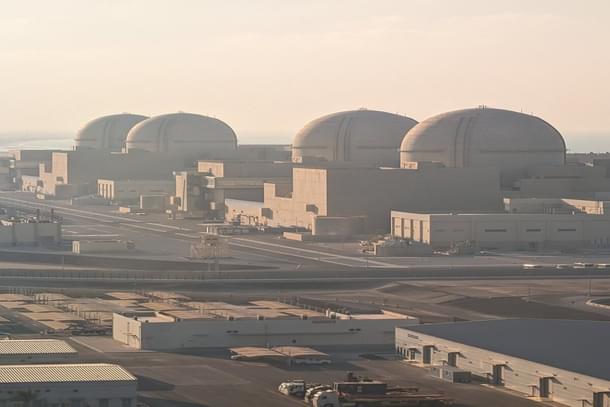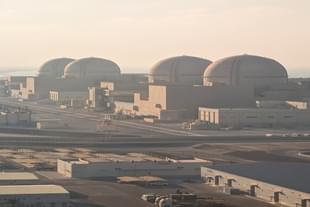Infrastructure
UAE: Arab World's First Nuclear Chapter Draws Close With Unit 4 Start-Up At Barakah Plant
Amit Mishra
Mar 04, 2024, 02:47 PM | Updated 03:03 PM IST
Save & read from anywhere!
Bookmark stories for easy access on any device or the Swarajya app.


Unit 4 of the Barakah Nuclear Power Station in the United Arab Emirates has been started up and will be linked to the national electricity grid “in the coming weeks”, the Emirates Nuclear Energy Corporation (ENEC) announced on 1 March.
The start-up of Unit 4 at the Barakah Plant marks its initial production of heat through nuclear fission, used for generating electricity by turning a turbine with steam. Once linked to the national grid, it will enter a testing phase to gradually increase its power output to full capacity.
The Barakah plant, situated in Al Dhafra, Emirate of Abu Dhabi, along the Arabian Gulf, lies approximately 53 km west-southwest of Ruwais city. It is equipped with four Advanced Power Reactor (APR)-1400 pressurised water reactors, each capable of producing up to 1,400 MWs of clean electricity.
As the first commercial nuclear facility in the Arab world, the three commercially operating units at Barakah are already generating more than 30 TWh of electricity.
ENEC has efficiently delivered the four units of the Barakah Plant within an accelerated delivery timeline. While commercial operation began at Barakh-3 in February 2023, Barakah-1 began commercial operation in April 2021 and Barakah-2 in March 2022.
Once operational, Unit 4 will bring the total capacity of the Barakah Plant to 5,600 MW of zero-carbon emission electricity, catering to 25 per cent of the UAE’s electricity requirements for the next six decades.
The plant will also contribute to a quarter of the country’s carbon-reduction commitments, known as the Nationally Determined Contribution (NDC) under the UN's Paris Agreement to meet global climate change goals.
ENEC, in collaboration with the World Nuclear Association, has unveiled Net Zero Nuclear, a platform advocating for the significant role of nuclear energy in achieving net zero emissions.
During COP28 in the UAE, leaders from 22 countries across four continents pledged to triple global nuclear energy capacity by 2050 to expedite the decarbonisation of the energy sector and heavy industries worldwide. Additionally, 150 companies committed to supporting this target.





